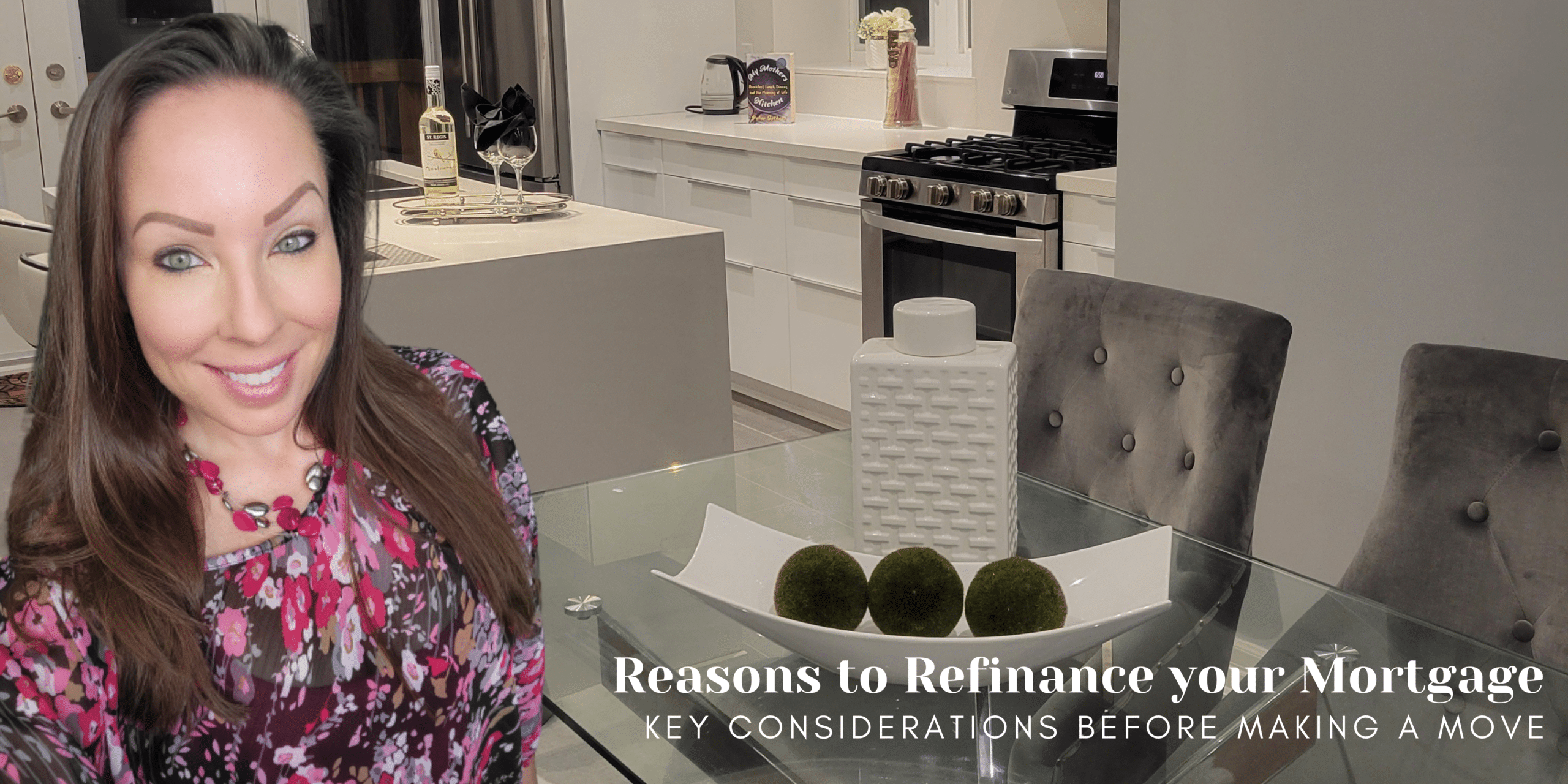
Mortgage rates have been sitting at record lows for the past several years and while there is the chance they may continue to creep back up in the spring, you may still want to refinance your mortgage. Why you would want to do so may range from lowering your monthly payments to pulling out equity to put towards home renovations or even an investment property.
Whatever the reasons, if you want to refinance your mortgage, this needs to be carefully considered. Depending on the type of mortgage you have and where you’re at in your term, you may have fees to pay and will need to go through the mortgage approval process from the start. It’s imperative to have clear objections in mind that will improve your financial position overall.
One of the primary reasons you may want to refinance your own is to get a lower interest rate. This is also known as a “rate-and-term” refinance and is probably one of, if not the, most popular reasons you may decide to refinance your mortgage.
Going way back to 2008, I know this was a primary reason for me. When I bought my first house in 2007, rates were about triple what they were just a year later. I locked in a fixed rate of 5.87% but I broke my mortgage 15 months later to switch to a variable rate of 2.1%.
Was there a cost to do so? Yes there was, but it was neglible. I paid $2,500 to break the mortgage but doing so brought my monthly payments down by $250/mth and knocked 15 years off of my amortization.
But, enough about me!
For close to 15 years, the economy has seen a very low-rate environment. As you can likely appreciate, the connection between the Bank of Canada’s target rate and mortgage rates can be challenging to understand. The reality is that low rates make money less costly to borrow which means you’re able to come out further ahead than you would be otherwise.
If you’re considering mortgage length, typically shorter terms have lower rates than longer terms do. This is because you’re paying back the mortgage in less time so your monthly payments could go up.
To get in on some big savings, a rate-and-term refinance for your mortgage is great for a homeowner if they have room to accommodate it in their budget. If you can shorten the term and lower your rate, you’ll be able to pay off your mortgage faster and save money.
If that’s not a great reason to refinance your mortgage, then I don’t know what is!
Another common consideration for home owners is the desire to consolidate any high-interest debt they have accumulated (ahem, credit cards!).
If you refinance your mortgage to consolidate these high interest loans or debts, you can greatly approve your cash flow and save lots of money long term, even if you find yourself with a slightly higher mortgage payment or rate.
This said, you should be aware that a disadvantage to this move is that you won’t be able to deduct the mortgage interest you pay on the cash out amount that exceeds the loan balance. This is because the funds aren’t being used to buy, build or improve your actual home.
Now, one other important point to note. Just because you’ve cleared your credit card or another debt, you need to make sure you don’t rack it back up again. You may even want to cut it up if this may be a problem for you.
If you’re going to refinance your mortgage due to this reason, you also need to make sure you can afford your new payments or you could risk losing your home.
When you bought your home, if you didn’t have the required 20%+ downpayment, you were likely hit with a CMHC fee, a mortgage insurance applied to high ratio mortgages.
These mortgage products can be a great way to get to home ownership if you don’t have a lot of money saved or your credit score is low – but there is an upfront fee included that is wrapped up in your mortgage.
When I bought my first home, I had 20% down but I found out the week after buying it that my business partner was expecting. We would be experiencing a major shift within my company in the year or two to come. As such, to err on the side of caution, I opted to put 10% down and save the rest – just in case. I wanted to make sure that I had a comfortable cushion if my company’s sales went down at all.
At the time, I understood this fee would be 2% of the mortgage and was expecting a $3,000 fee. What I wasn’t told by my broker was that the lender considered me extra high risk as I had one year of blended income (a mix of employed and self-employed). As such, they increased my CMHC fee from 2% to 4.75% and the $3,000 I was expecting ballooned to $10,000.
I had no idea about this until the day before my closing so as you can imagine, I wasn’t too happy about this. Although I expressed my concern and frustration to my mortgage broker, when I finally got ahold of him, they tried to make light of it since it was “wrapped up” in the mortgage.
While this may be true, it was still $10,000 I wouldn’t be seeing back when I sold my home. Looking back, I should’ve just put the full 20% down but of course, I wasn’t provided with all of the information I should’ve received to make this decision.
You live and learn, right?
Moving along, if you want to refinance your mortgage to eliminate your mortgage insurance, once you reach 20% equity in your home, which can potentially be achieved by a re-appraisal after buying it, this may be feasible.
While there are a few really great reasons why you should refinance your mortgage, there are also some that may not be so good.
If you want to save for a new home, refinancing may not be a good idea. Refinancing takes work and anything that takes work, is not free. The cost of refinancing may be around 2%+/- in closing costs and it can take time to break event.
Moving into another home before recovering these costs mean you may lose money even if you lower your monthly payments for now. If a move is intended within 5 years, this may not be the best option for you.
Do you like the finer things in life? Well, that’s not the right reason to refinance your mortgage. If you don’t have a clear idea of what you want to do with any cash you may free up by refinancing, you may very easily misuse it (e.g. a new car, RV or some other kind of toy!).
Remember, you’re buying these things with your home. If you find yourself in financial hot water later, then you’ll have less equity and depreciating rather than appreciating assets that can drag you down. You should only refinance to improve your financial picture – and this is definitely not something that will do so.
If you’re going to refinance your mortgage, it’s important to think about a reasonable term rather than something significantly longer term. The longer that it takes to pay down your mortgage, the more interest you’re going to be paying.
When you’re in the last half of a mortgage (e.g. the last 10 or 20 years), it’s not a good idea to refinance because you’re FINALLY at the stage in the game where your payments reflect more principal than interest. If you start over, then the amortization begins from scratch.
Got other financial goals? Well refinancing your mortgage may mean you’re not contributing to your retirement savings, university funds for your children or investment that may potentially yield a higher return.
Lastly, if you’re a new homeowner, it may not be the greatest idea to remortgage. As noted earlier on, I did – but that doesn’t mean it’s a good idea for everyone. If you’re saving a percent or less, it may not be worth it.
Whether you decide to refinance your mortgage or not, the important thing to keep in mind is that you should consider your reasons and rationale from all angles.
Considering refinancing your mortgage? I have several amazing contacts in the mortgage industry and would be happy to make some warm introductions.
If you’re looking to buy your first home, upsize or downsize, let’s talk! I can be reached at 647.896.6584, by email at info@serenaholmesrealtor.com or by filling out this simple contact form. For lots of other great tips, make sure we’re connected on social and you’ve subscribed to my YouTube channel.
Should you be interested in calculating a new mortgage, click here.










